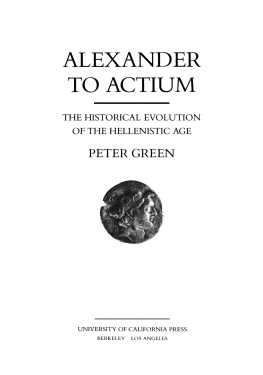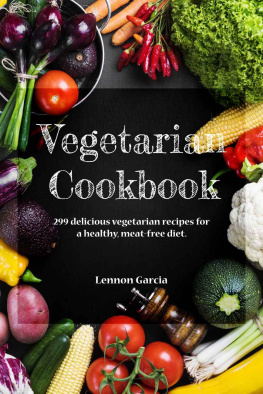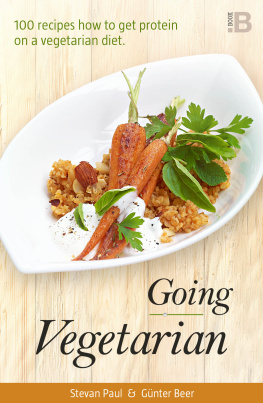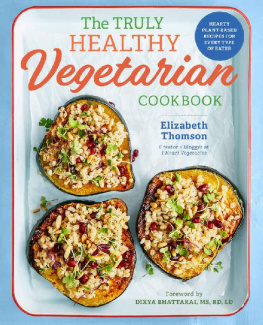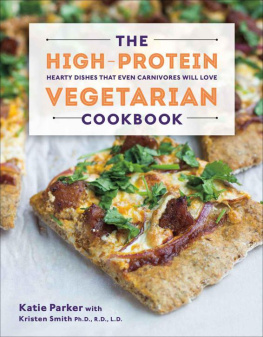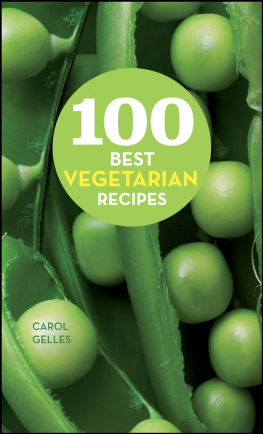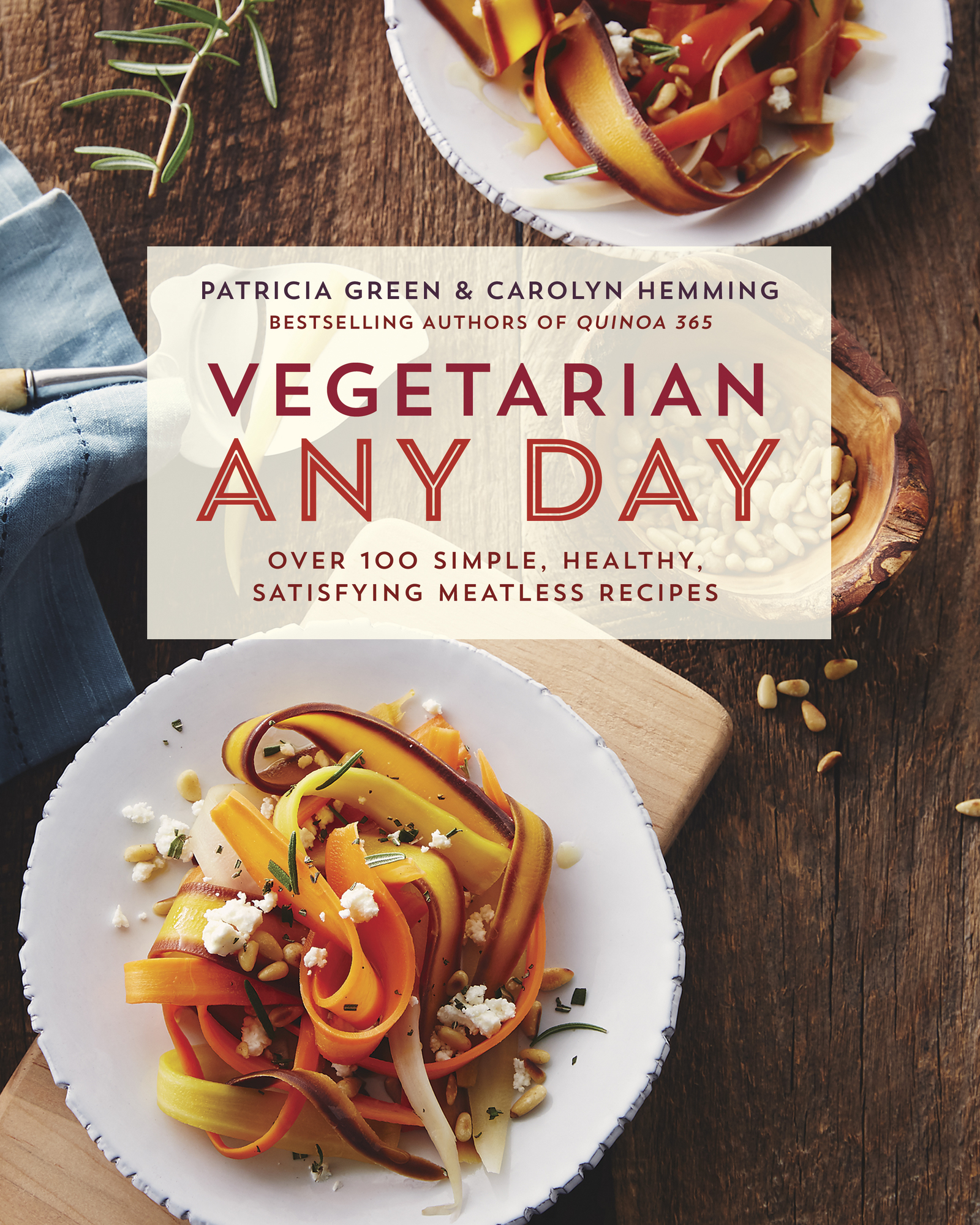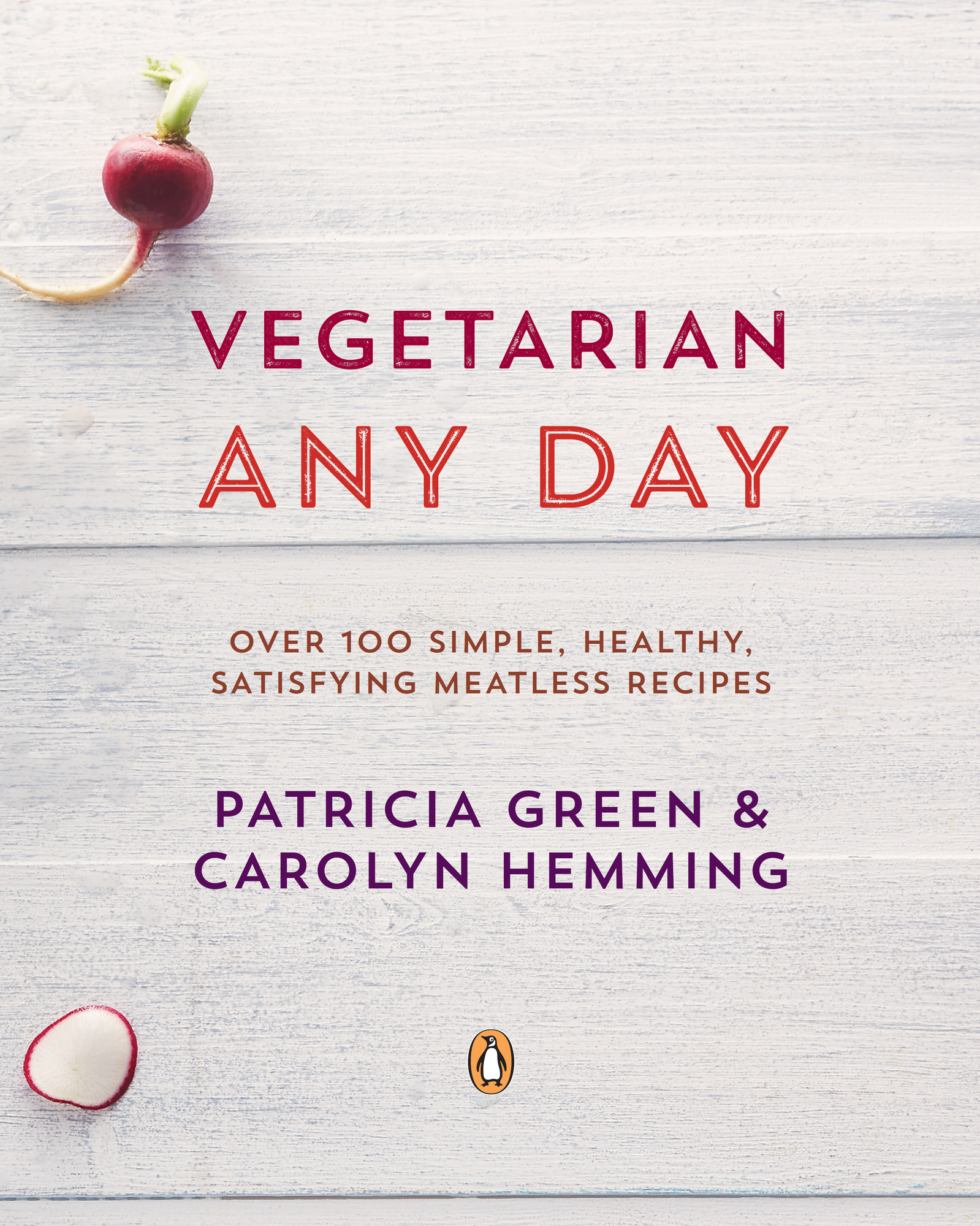Contents
PENGUIN
an imprint of Penguin Canada, a division of Penguin Random House Canada Limited
Canada USA UK Ireland Australia New Zealand India South Africa China
First published 2017
Copyright 2017 by Carolyn Hemming and Patricia Green
All rights reserved. Without limiting the rights under copyright reserved above, no part of this publication may be reproduced, stored in or introduced into a retrieval system, or transmitted in any form or by any means (electronic, mechanical, photocopying, recording or otherwise), without the prior written permission of both the copyright owner and the above publisher of this book.
www.penguinrandomhouse.ca
LIBRARY AND ARCHIVES CANADA CATALOGUING IN PUBLICATION
Green, Patricia, author
Vegetarian any day : over 100 simple, healthy, satisfying meatless recipes / Patricia Green and Carolyn Hemming.
Includes index.
ISBN 9780143190493 (paperback)
ISBN 9780735232969 (electronic)
1. Vegetarian cooking. 2. Cookbooks. I. Hemming, Carolyn, author II. Title.
TX837.G74 2017641.5636C2016-906078-0
Book design by Leah Springate
Cover images by Ryan Szulc
Food photography by Ryan Szulc
Food styling by Nancy Midwicki
Prop styling by Patricia Green, Carolyn Hemming, Ryan Szulc, and Nancy Midwicki


v4.1
a
ALSO BY PATRICIA GREEN AND CAROLYN HEMMING
Sweet Goodness
Grain Power
Quinoa Revolution
Quinoa 365
CONTENTS
EATING LESS MEAT
A re you a flexitarian? We asked our drycleaner, dentist, school principal, mail carrier, lawyer, flight attendant, pharmacist, grocery store cashier, neighbours and even our tax planner, Gary, who admitted, he too, eats meatless a couple of times a week. It was interesting to discover that for many, eating meatless occasionally is becoming a choicethough not necessarily a conscious one. Flexitarian is the recently coined term to identify people who occasionally eat meatless. So you may already be flexitarian, and you dont even know it. Adding a few new vegetarian recipes to your cooking routine will make it even easier to eat meatless, be healthful and enjoy a long list of nutritional benefits.
The concept of Meatless Mondays has recently raised awareness of eating vegetarian once a week. It may come from ethical, social or political convictions. Maybe its the pursuit of improved health and longevity, or quite possibly it is simply a circumstance of gradually changing habits. Its not rocket science, you may say; eating habits evolve. But did we ever expect that surrounded by an abundance of cross-cultural meat options from alligator chorizo to venison meatloaf, that our human, omnivorous, once hunter-gatherer selves would maybe one day choose a dish, say, sans meat? With meat being such a staple part of the traditional North American diet and a burger joint on every major thoroughfare, it may have seemed doubtful that day would ever come. But thanks to good ol mom and those seaweed chips she kept in the cupboard, Patricia and I both have always been fairly open to evolving food habits.
While Patricia was always somewhat cooperative in sampling moms uber-healthful cooking, I was more reluctant and skeptical, especially when it came to eating meat. I recall sitting at the dinner table for hours in protest, long after the dishes were cleared and washed, firmly committed to resisting clam chowder or moms favourite mineral supplement, liver. I can still see my Viking father towering over me, quizzically asking how I could possibly refuse to eat what he saw as one of the most beloved foods of my 70s childhood, the cheeseburger. The texture and flavour just didnt appeal to me.
Nowadays, we all have a new label depending on our eating habits. Ive never strayed from being a picky and occasional meat-eater, making me a veteran flexitarian. Patricia has gone from flexitarian to committed pescetarian (a vegetarian who eats fish), as that is what most agrees with her stomach. And our once-upon-a-time, daily-meat-loving husbands now realize theyve been flexitariansfor years!
In 2010, after the incredible success of our first book, Quinoa 365: The Everyday Superfood, we were invited to speak to the employees of a large, national meat processor. With a plethora of protein-rich recipes under our belts, many of which offered meat alternatives, we asked the lead scientist, Why us? To our fascination, she replied, Meat is no longer the main dish; its the side. Its true, red meat consumption has been decreasing in Canada and the United States since the late 90s as a result of rising costs, changing palates, an aging population, ethical or environmental concerns, religious practice and a shift to overall healthier lifestyles.
We cant ignore that to eat or not to eat meat is a debate that continues to be a contentious issue. Ethical and political arguments for eating meatless raise obvious concerns about animal cruelty and environmental destruction, offering strong support for vegetarian lifestyles. Eating meat has also been linked to disease; however, science reveals that the correlation may arise from overconsumption, rather than average consumption. Eating meat can be an easy way to get a rich dose of protein and nutrients, but it may be wise to reduce the amount we consume, even if health is our only reason. The current recommendation for healthy meat consumption is no more than one serving of meat three times a week. Even our favourite global food expert, Michael Pollan, in his New York Times bestseller In Defense of Food, claims although he hasnt found a compelling enough reason to exclude meat completely from his diet, he definitely agrees with reducing the amount of it in your diet.
Medical research has also shown that increased fruit and vegetable intake can boost your health and provide benefits that include improved immune function and a reduced risk of cardiovascular disease, high blood pressure, type 2 diabetes, cancer and even allergies. But if you plan to eliminate meat from your diet, you must ensure your body is nourished with its required protein and nutrients. Being a full-time vegetarian demands a bit of effort to make sure youre eating what you need to prevent serious illness. Avoiding meat for health reasons can end up doing more harm than good if you arent receiving the vitamins and minerals your body needs to stay healthy.




